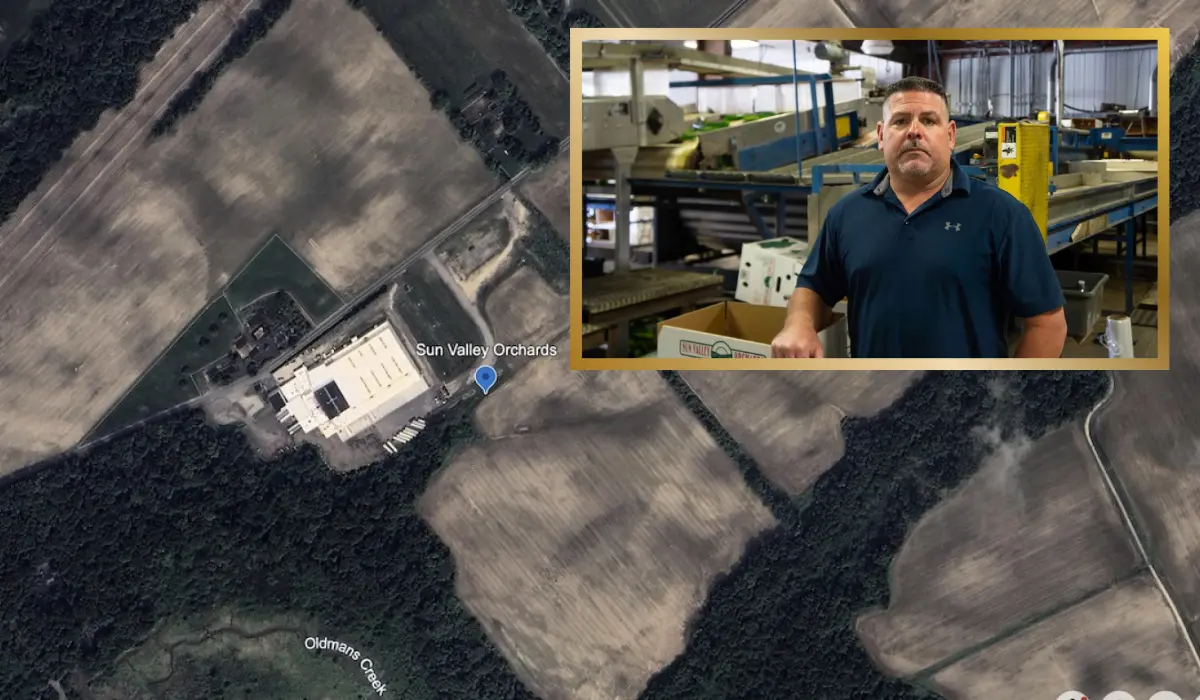A federal appeals court has unanimously ruled that the U.S. Department of Labor (DOL) violated the Constitution when it prosecuted and punished a New Jersey family farm inside the agency’s own adjudicatory system, an internal process that investigator, prosecutor, judge, and appellate panel all shared.
The decision caps nearly a decade of litigation for brothers Joe and Russell Marino, who lost their fourth‑generation business, Sun Valley Orchards, before outside judges finally weighed the merits.
The ruling from the 3rd U.S. Circuit Court of Appeals, issued in July 2025, vindicates the Marinos’ challenge to DOL’s administrative enforcement but lands too late to save their operation.
Sun Valley, once among the largest vegetable producers in New Jersey, was sold off at auction in 2021 amid mounting legal costs, penalties, and tough farm economics.
For the family, the decision restores reputation; for the broader public, it narrows how federal agencies can impose civil penalties without a jury.
A century of work, undone
The Marino story started long before the lawsuit. Their great‑grandparents emigrated from Sicily around 1900 and carved a foothold in the soils of Gloucester County, outside Swedesboro. What began as a modest plot grew to roughly 3,000 acres across four generations.
At its peak, Sun Valley Orchards produced asparagus, cucumbers, broccoli, cabbage, bell peppers, eggplant, sweet corn, and other staples.
During harvest, the farm employed about 180 seasonal workers and routinely shipped 15 to 20 tractor‑trailers of produce a day to buyers across the Northeast, the South, the Midwest, and into Canada.
Regulatory inspections were part of the rhythm. DOL would appear in mid‑season, check payroll, transportation, and housing, and typically leave a same‑day list of tweaks.
The Marinos say they made those fixes promptly. That cadence changed in 2015—the year Sun Valley turned to the H‑2A temporary agricultural worker program to fill growing labor gaps.
Instead of a one‑day look by a single official, three DOL inspectors arrived and stayed for about four days. No findings were delivered when they left. Months passed with silence.
In January 2016, a DOL director from Washington, D.C., appeared at the farm office with two agents. The trio accused Sun Valley of violating H‑2A rules and said the farm owed more than $550,000 in back wages and civil penalties. To the Marinos, the number was staggering; to the agency, it was the product of two core allegations.
The allegations: a disputed “termination” and a checked box
The first dispute centered on 17 H‑2A workers from Mexico who had arrived just as the spring asparagus harvest, famously grueling work, was starting.
The workers had attested to experience, but after a day in the fields, they told the farm they would not continue. Sun Valley documented their departure, with signatures, on advice from its H‑2A consultant, and moved on with the season.
DOL later concluded that the workers had been terminated, not that they quit, triggering a contractual obligation under H‑2A rules to pay each worker three‑quarters of the season’s guaranteed hours.
The agency thus assessed substantial back wages tied to those 17 workers alone, an issue the Marinos say was never raised during the on‑site inspection when it could have been corrected or clarified.
The second dispute involved meals. In the application paperwork, employers must either promise kitchen access for workers to prepare their own food or provide a meal plan.
Sun Valley’s consultant selected the “kitchen” option. In practice, and as in prior years, the farm arranged cooked meals on site, prepared by a crew member’s family at a fixed, low weekly cost that tracked federal guidance, about $80 per week per worker. According to the Marinos, DOL inspectors had seen and praised the arrangement in earlier visits.
The 2016 notice treated the checked box as a binding promise of kitchen access, not a meal plan, and characterized the on‑site meals as a violation.
DOL demanded reimbursement related to those meals and levied a $2,400 penalty per worker, applied not only to approximately 96 H‑2A workers but, the family says, to domestic employees as well, pushing the meal‑related tally alone over $300,000.
Sun Valley maintains it never docked wages for food or anything else and that no one was misled; in their telling, this was a paperwork mistake, not exploitation.
When asked by the outlet that first reported the Marinos’ story to discuss the case, DOL referred questions to the Department of Justice. DOJ did not respond, according to that report.
Tried and punished inside the agency
What happened next illuminates why the 3rd Circuit’s ruling matters beyond this one farm. The government brought the case before a DOL administrative law judge (ALJ), not an independent federal judge.
In 2017, after a week‑long hearing, a former DOL attorney serving as ALJ found Sun Valley liable on all counts. The agency allowed video testimony from three of the original 17 workers in Mexico; the Marinos say a human‑rights advocate helped locate them and appeared to act as a go‑between, raising concerns about coaching and transparency the farm could not fully probe from afar. The ALJ entered judgment in favor of DOL.
Appeal meant another trip through DOL’s own appellate system. There, a panel within the same department affirmed the outcome.
By then, the Marinos had spent roughly $180,000 on private lawyers and still faced over a half‑million dollars in agency‑imposed penalties ($212,250 in civil fines and $369,703 in back wages). Throughout, no jury heard the dispute; no Article III judge presided.
To the brothers, the process felt predetermined: the same department that investigated also prosecuted, adjudicated, and then reviewed its own verdict. That arrangement, long standard across many federal agencies—was the precise target of their constitutional challenge.
The constitutional pivot: Jarkesy and a new opening
A turning point arrived in 2021 when the Institute for Justice (IJ), a public‑interest law firm, took up the Marinos’ cause and filed suit against DOL. IJ’s core claim was straightforward: when a federal agency seeks to impose punitive civil penalties, the Seventh Amendment guarantees the right to a jury trial, and the government cannot short‑circuit that by keeping the entire proceeding inside its own walls.
The legal landscape shifted again in 2024 with the Supreme Court’s decision in SEC v. Jarkesy, which held that certain agency enforcement actions seeking civil penalties must be brought in federal court where a jury is available, not decided by an ALJ alone.
That ruling, though focused on the Securities and Exchange Commission, cracked open the door for challenges to similar penalty regimes elsewhere in the administrative state.
IJ pressed forward, and in July 2025 the 3rd Circuit unanimously sided with the Marinos. The panel concluded that DOL’s use of in‑house adjudication to impose civil fines in this context violated constitutional guarantees.
In practical terms, the decision bars the department from acting as investigator, prosecutor, judge, and appeals court when it seeks to punish with monetary penalties, at least within the 3rd Circuit’s jurisdiction and for cases analogous to Sun Valley’s.
Why the decision reverberates beyond one farm
The Marino case amplifies a broader critique of in‑house courts. The federal government includes hundreds of departments, agencies, and sub‑agencies, well over 400 by some counts, and many operate their own enforcement dockets. Win rates inside those systems can be striking.
Former FTC Commissioner Joshua Wright noted in 2015 that during a two‑decade span, the commission had affirmed liability in 100 percent of cases where the FTC’s ALJ ruled for staff, and reversed in 100 percent of cases where the ALJ found no liability, figures he cited as signs of institutional bias.
IJ argues that money also shapes incentives. In agricultural cases alone, DOL collected $4.9 million in back wages and imposed $5.8 million in penalties in 2024, according to the group’s tally.
Advocacy lawyers contend that funds are often not returned to workers and can instead be retained or sent to the Treasury, creating a potential conflict when the same entity that benefits financially also decides guilt.
Against that backdrop, the 3rd Circuit’s ruling is a watershed. It strengthens the requirement that when the government seeks to punish through civil fines, citizens get access to a neutral judge and a jury of peers. Agencies may still inspect, investigate, and bring cases, but when penalties are on the line, the courtroom must be independent.
The personal cost: a farm sold by the piece
Although the legal victory is significant, it arrived after the farm was gone. A mix of rough weather and weak markets from 2019 through 2021, combined with looming DOL penalties and steep legal bills, pushed Sun Valley to the brink. In December 2021, the Marinos liquidated the business: land, equipment, even the shovels.
The brothers lined up the machinery for bidders and sent their father out of town so he would not see strangers cart away the tools and tractors he had spent a lifetime assembling.
They settled outstanding family buyouts to protect their elders, finished the sale, and left with little to show beyond cleared debts.
Friends and longtime associates knew their reputation, the family says, but the formal verdicts from DOL’s tribunal had made them radioactive in industry circles.
Joe Marino says he reached out to major media and political figures without success during the long fight. With no independent court looking at the evidence and no jury to hear their side, the brothers felt locked in an echo chamber.
Only in 2025, with IJ’s help and the 3rd Circuit’s decision, did an outside tribunal assess the constitutional issue and rule in their favor. Joe learned of the decision over the phone; by his account, the relief of finally being heard after nine years was overwhelming.
What the case means for farm labor and H‑2A
Beyond procedure, the case surfaces policy questions around seasonal labor. The Marinos’ conflict with DOL arose as they transitioned to H‑2A to cope with an intensifying domestic labor shortage.
They argue the program is cumbersome, fragile, and expensive, and that its administration should be moved from DOL to the U.S. Department of Agriculture, which they believe better understands production realities.
In their view, the program’s complexity, illustrated by a checked box that spiraled into six‑figure penalties, invites gotcha enforcement rather than transparent compliance.
The brothers insist they provided affordable, consistent meals and that inspectors had seen the arrangement for years without objection.
They maintain they never garnished wages to recoup food costs and that when 17 workers elected not to cut asparagus, the farm documented their choice and carried on.
Regardless of how one views those disputes, the 3rd Circuit’s holding does not bless or condemn the underlying facts; it limits the government’s ability to be judge and jury when it seeks to punish with money.
A landmark—tempered by loss
The Marinos’ court win showcases how a single case can reshape the administrative landscape. It also underscores how long constitutional fights take, and what can be lost along the way. The family farm that took 125 years to build could not survive the last nine.
The decision clears the brothers’ names and sets a precedent for others now mired in similar in‑house prosecutions, but it cannot reverse the auction block.
For small businesses and farmers across the country, the message is immediate: when an agency seeks to impose civil penalties, the path increasingly runs through federal court, not the agency’s own courtroom.
For regulators, the decision is a signal to recalibrate enforcement strategies: investigate and charge as before, but expect to prove penalty cases before independent judges and juries.
For the Marino family, it is a hard‑won vindication. They hope it will spare others the decade‑long ordeal they endured and prompt Congress and the executive branch to reconsider how H‑2A is administered and how agencies wield in‑house tribunals.
Whether or not Washington acts, the 3rd Circuit has drawn a constitutional line, one that came too late to save Sun Valley Orchards, but soon enough to change how similar cases will be handled from here on out.




